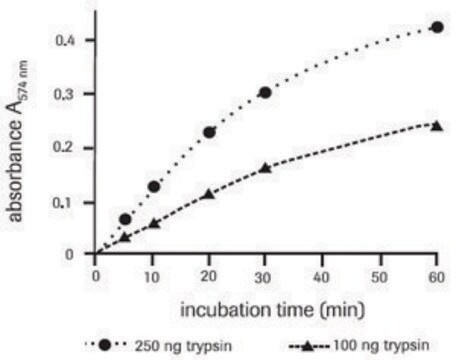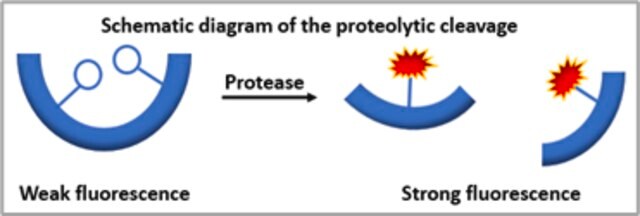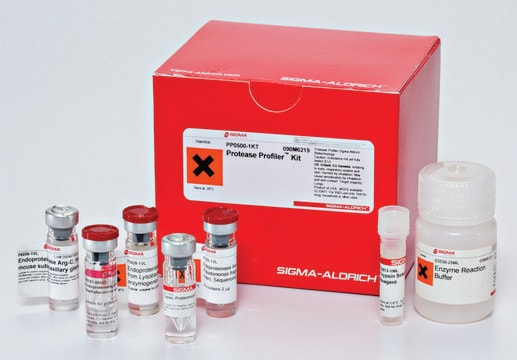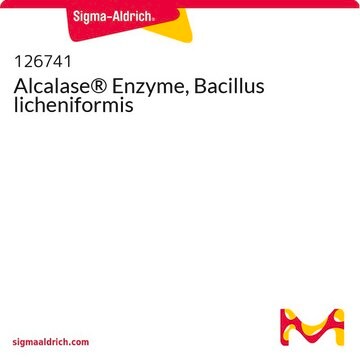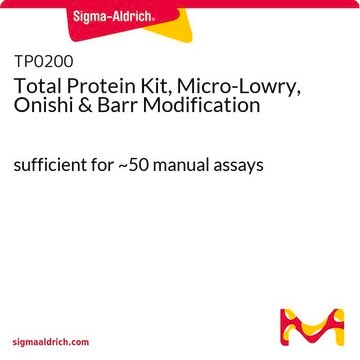Recommended Products
usage
sufficient for 200 tests
Quality Level
manufacturer/tradename
Calbiochem®
storage condition
OK to freeze
protect from light
assay range
sensitivity: 10 ng/mL
input
sample type biological sample(s)
detection method
colorimetric
shipped in
wet ice
storage temp.
−20°C
General description
A kit suitable for quantitative array of a wide variety of proteases in biological samples, utilizing FTC-casein as a substrate. Enzyme activities that have been detected with this assay kit include: chymotrypsin, elastase, plasminogen, PRONASE® Protease, subtilisin, thermolysin, and trypsin.
This Protease Assay Kit is suitable for the quantitative determination of protease activity in biological samples. This kit has been tested for its suitability in detecting a wide variety of proteases, including serine proteases (trypsin, chymotrypsin, thrombin, plasmin, elastase, subtilisin), cysteine proteases (papain, cathepsin B) and acid proteases (thermolysin, pepsin). Each kit provides sufficient reagents for 200 assays. When used as recommended, this kit is ~100-fold more sensitive than either the casein-gel assay or casein A280 assay. The Protease Assay Kit can detect ~10 ng/ml of protease when a 24 h incubation is used. The sensitivity can be enhanced by up to 3-fold by using a fluorometer (excitation 490 nm and emission 525 nm) rather than a spectrophotometer to detect the proteolytic end products.
Components
A Fluorescent-Casein Substrate, Incubation Buffer, Assay Buffer Trypsin Standard, and a user protocol.
Warning
Toxicity: Multiple Toxicity Values, refer to MSDS (O)
Specifications
Assay Time: 3 h
Storage and Stability
• FTC-casein should be stored at -20°C and is stable for one year from the date of purchase. FTC-casein stored at 4°C is stable for 2-3 days. Several freeze-thaw cycles will lead to a minor increase in the background fluorescence, so following initial thawing, we suggest that this reagent be divided into 5 aliquots. FTC-casein is light sensitive and should be protected from light.
• Protease positive control should be stored at -20°C. As with many proteases, trypsin is susceptible to autolysis and you may notice a reduction in trypsin activity with time, even if stored at -20°C.
• Incubation buffer and assay buffer may be stored at 4°C or -20°C.
• Protease positive control should be stored at -20°C. As with many proteases, trypsin is susceptible to autolysis and you may notice a reduction in trypsin activity with time, even if stored at -20°C.
• Incubation buffer and assay buffer may be stored at 4°C or -20°C.
Other Notes
Twining, S.S. 1984. Anal. Biochem.143, 30.
Wiesner, R., et al. 1982. Anal. Biochem.121, 290.
Wiesner, R., et al. 1982. Anal. Biochem.121, 290.
Legal Information
CALBIOCHEM is a registered trademark of Merck KGaA, Darmstadt, Germany
PRONASE is a registered trademark of Merck KGaA, Darmstadt, Germany
Storage Class
10 - Combustible liquids
Certificates of Analysis (COA)
Search for Certificates of Analysis (COA) by entering the products Lot/Batch Number. Lot and Batch Numbers can be found on a product’s label following the words ‘Lot’ or ‘Batch’.
Already Own This Product?
Find documentation for the products that you have recently purchased in the Document Library.
Customers Also Viewed
S S Twining
Analytical biochemistry, 143(1), 30-34 (1984-11-15)
A simple inexpensive sensitive protease assay was developed using soluble fluorescein isothiocyanate (FITC)-labeled casein. Casein was reacted with FITC to form the fluorescein thiocarbamoyl derivative. This substrate is cleaved by trypsin, chymotrypsin, elastase, subtilisin, and thermolysin in a linear time-dependent
Shuofeng Yuan et al.
Protein & cell, 13(12), 940-953 (2022-04-07)
The emergence of SARS-CoV-2 variants of concern and repeated outbreaks of coronavirus epidemics in the past two decades emphasize the need for next-generation pan-coronaviral therapeutics. Drugging the multi-functional papain-like protease (PLpro) domain of the viral nsp3 holds promise. However, none
A new assay for proteases using fluorescent labeling of proteins.
R Wiesner et al.
Analytical biochemistry, 121(2), 290-294 (1982-04-01)
Zachary R Gergely et al.
Journal of biological research (Thessalonike, Greece), 25, 15-15 (2018-08-18)
The insect-trapping leaves of Dionaea muscipula provide a model for studying the secretory pathway of an inducible plant secretory system. The leaf glands were induced with bovine serum albumin to secrete proteases that were characterized via zymogram activity gels over
Our team of scientists has experience in all areas of research including Life Science, Material Science, Chemical Synthesis, Chromatography, Analytical and many others.
Contact Technical Service
